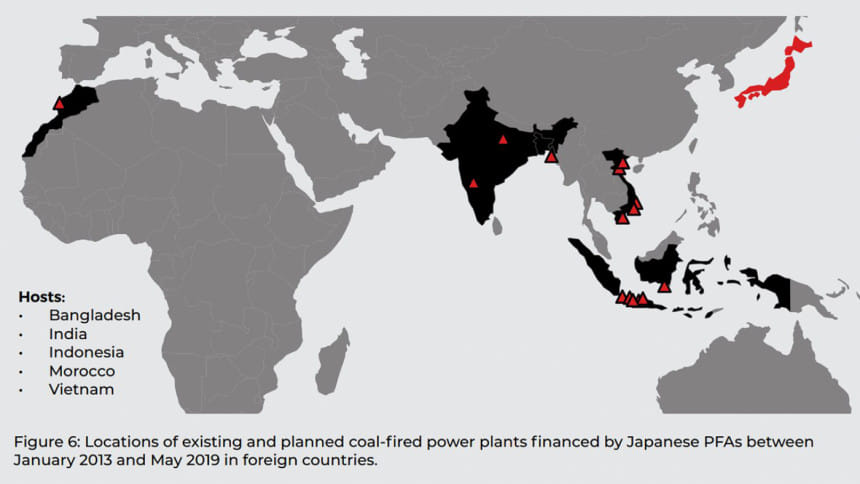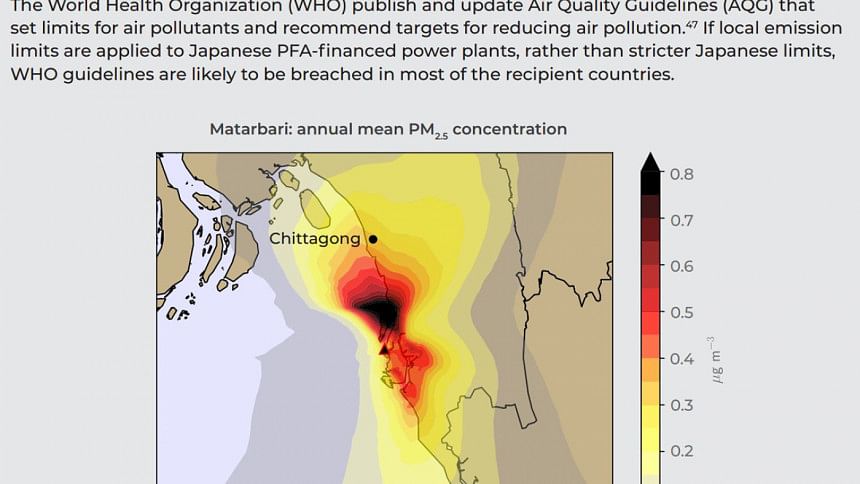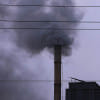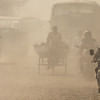Matarbari Coal Power Plant: Pollution to claim 14,000 lives in 30 yrs

Over three million people from South and Southeast Asia, including Bangladesh, will be exposed to air pollution and face health hazards as the Japanese public finance agencies are funding 17 coal-fired power plants in the region, says a Greenpeace report.
It is estimated that the Japanese investment would cause a total of 148,000 to 410,000 avoidable premature deaths over the typical 30-year operation period of those plants, said the joint Greenpeace Southeast Asia and Greenpeace Japan report released yesterday in Singapore.
In Bangladesh, the number of premature deaths would be up to 14,000 due to pollution by Japan-funded Matarbari coal-fired power plant in 30 years since it goes into operation, the report estimates.
The report projected that the Japanese investments would lead to 160,000 premature deaths in India, 72,000 in Indonesia and 36,000 in Vietnam due to long-term exposures to fine particulate matter and nitrogen dioxide pollution.
All these deaths could be avoided by shifting the investments into renewable energy, the report said.
The report, titled “A deadly double standard:

How Japan’s financing of highly polluting overseas coal plants endangers public health”, also stated that Japanese-financed coal power plants are likely to emit up to 13 times more nitrogen oxides (NOx), 33 times more sulfur dioxide (SO2) and 40 times more dust than those plants built in Japan.
Most of those power plants located in South and Southeast Asian countries were financed by Japanese public finance agencies JBIC, JICA and NEXI. They have invested $16.7 billion in coal plants between January 2013 to May 2019, of which Indonesia is the major recipient with 42 percent, Vietnam 20 percent and Bangladesh 18 percent.
Japan has developed technology to reduce emissions and is using that in their own coal-fired plants, but they are financing far inferior technologies in other countries, the report said, adding that the Japanese government was “exporting air pollution overseas”.
Japan has a stricter guideline than WHO set recommendations for air pollution for their own country. But the power plants Japan is financing would breach the WHO guidelines, the report mentioned.
According to the World Health Organization, air pollution increases the risk of diseases such as stroke, lung cancer, heart and respiratory illness in adults, as well as respiratory infections in children.
“It’s unfortunate to see the gap between Japan’s promises of exporting quality infrastructure and the reality of low-quality coal technology exports. Japan should honour its trading partners and citizens of those countries by promoting energy technologies that stop hurting people’s health and the environment,” said Senior Energy Campaigner Hanna Hakko at Greenpeace Japan.
Japan is currently the only G7 country still actively building new coal power plants at home and abroad, and is the second largest public investor in overseas coal projects among the G20 countries.
“If it’s not good enough for Japan, it’s not good enough for Indonesia. Governments in the host countries of Japan’s coal projects must protect their citizens by setting stronger emission standards,” Tata Mustasya, Greenpeace Southeast Asia’s regional climate and energy campaign coordinator, said in the report.
Greenpeace demands that both Japan and countries receiving Japanese coal financing immediately shift away from coal and move toward clean renewable energy sources, the report added.

 For all latest news, follow The Daily Star's Google News channel.
For all latest news, follow The Daily Star's Google News channel. 







Comments